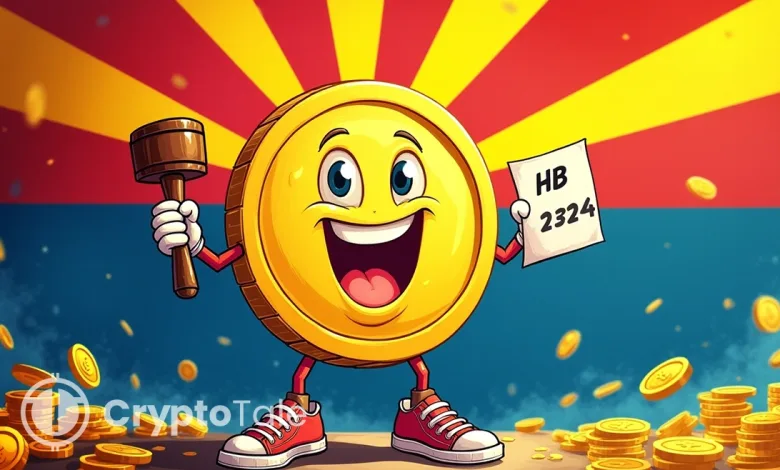Arizona Governor Rejects State Crypto Asset Reserve Bill

- Arizona lawmakers passed HB 2324 to hold seized cryptocurrency in a new state fund.
- Governor Hobbs vetoed the bill, saying it would weaken local enforcement authority.
- HB2749 passed because it addressed unclaimed assets, not active investigations or seizures.
Arizona Governor Katie Hobbs has vetoed House Bill 2324, a proposal aimed at creating a state-controlled reserve fund to manage cryptocurrencies seized through criminal activity. She stated the bill would remove seized assets from local jurisdictions and weaken cooperation between agencies during digital asset investigations.
Initially voted down by the House in early May during its third reading, the bill was later revived through a Senate reconsideration vote on June 19, where it passed narrowly with a 16–14 vote. It was then approved by the House on June 24 with a 34–22 vote. Despite gaining legislative momentum, the measure was halted when Governor Hobbs issued a veto letter to House Speaker Steve Montenegro.
She warned that transferring control of seized crypto assets to the state level would “disincentivize local enforcement from working with the state on digital asset forfeiture.” While an override of the veto requires a two-thirds majority in both chambers, the existing vote tallies suggest that such an outcome is unlikely unless legislators switch their stance.
How HB2324 Proposed to Handle Seized Crypto
The purpose of House Bill 2324 is to amend the current Arizona law of forfeiture by including digital assets and establishing the Bitcoin and Digital Assets Reserve Fund, which the Arizona State Treasurer will manage. This was aimed at enabling the state to receive and administer seized cryptocurrency within an orderly, non-speculative system.
The bill laid out a formula for distributing proceeds from seized digital assets. The first $300,000 from each forfeiture case would go to the Arizona Attorney General’s office. Anything above that would be split—50% to the AG’s office, 25% to the general fund, and 25% to the reserve fund.
Supporters, mainly Republican lawmakers, argued that the bill established a systematic method for managing seized cryptocurrency while minimizing direct investment risk. They viewed it as a step toward building infrastructure that could handle the rising number of digital asset forfeitures linked to criminal activity.
Governor’s Veto Rooted in Jurisdictional Concerns
Governor Hobbs made it clear in her message that she believes centralizing control of seized crypto could disrupt vital partnerships between state and local enforcement. By diverting these assets from local agencies, the bill could reduce their motivation to participate in digital asset seizures, potentially undermining critical investigations.
Related: Arizona Senate Approves Bitcoin Reserve Bill in Tight Vote
The veto of HB2324 aligns with Hobbs’ rejection of two earlier digital asset bills this session. Senate Bill 1025 proposed the Arizona Strategic Bitcoin Reserve and would have allowed investment of up to 10% in Bitcoin. Senate Bill 1373 proposed a Digital Asset Strategic Reserve Fund, which would be funded by seized cryptocurrency. Both were rejected due to perceived risks and lack of proven value.
Yet, Hobbs has shown her will to support measured regulation. She signed HB2749 into law, allowing the state to manage unclaimed digital assets, such as abandoned wallets or airdrops. Unlike HB2324, it did not interfere with local law enforcement processes or asset control.




